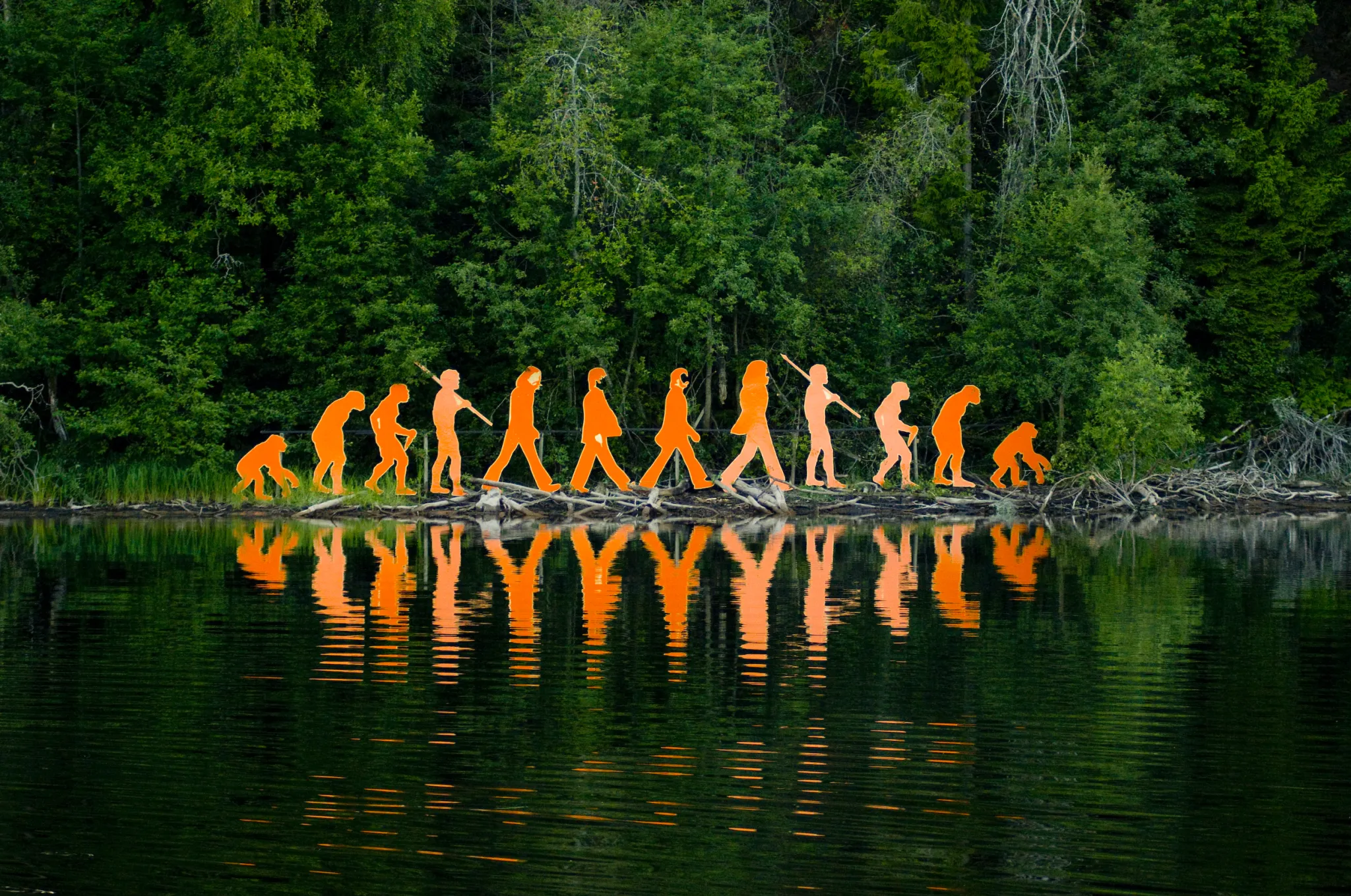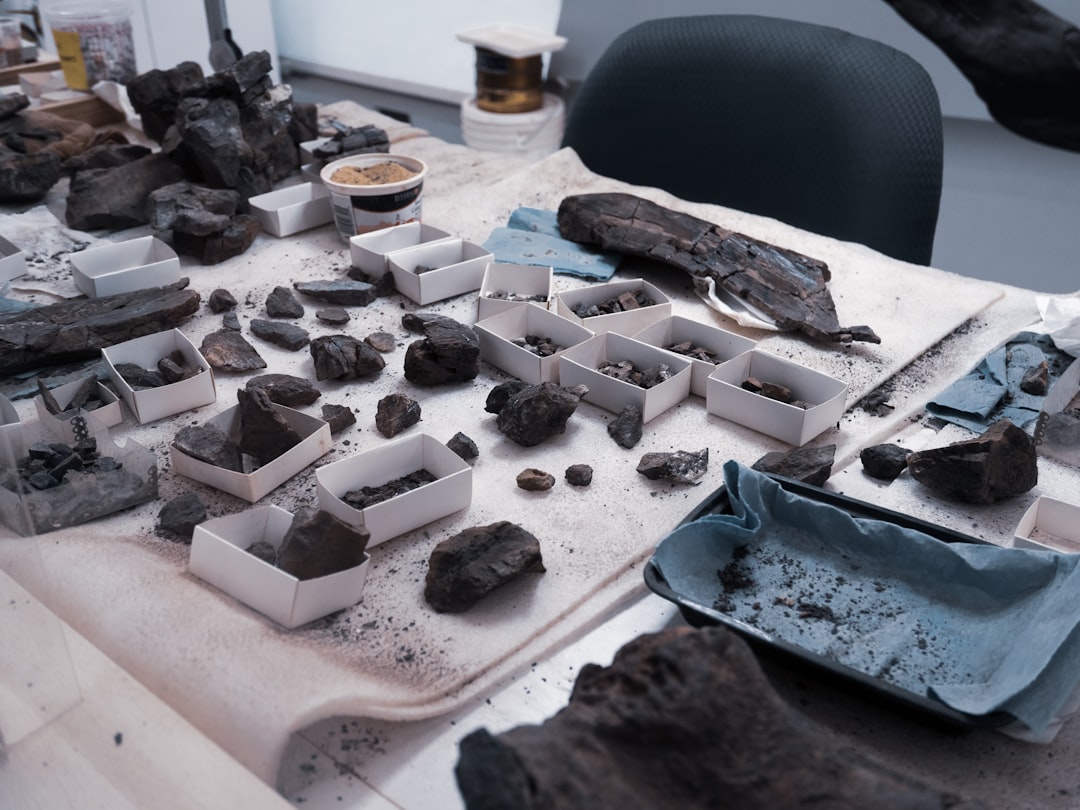Since the discovery of fossils, the relationship between the Bible and human evolution has been a topic of discussion among scientists and theologians. While the idea of cavemen may seem out-of-place in the biblical account of human origins, deeper investigation reveals a complex relationship between what the Bible says and what modern science has to show. Read on to learn more about the topic and expand your understanding.
The Biblical Account of Creationism

According to the Bible, God created the universe and everything in it. The book of Genesis gives us a detailed account of creation that spans over six days. On the first day, God created light, separating it from the darkness. On the second day, He created the sky and separated it from the water. On the third day, He created the land and the seas, and vegetation. On the fourth day, He created the sun, moon and stars. On the fifth day, He created the fish and the birds, while on the sixth day He created the land animals and finally, humans.
This Biblical account of creationism has been a matter of debate for centuries, particularly when it comes to the origin of humans and the existence of cavemen. Some Christians adhere strictly to the literal interpretation of the Bible, which implies that humans were created in their present form and did not evolve from pre-existing life forms.

However, this view is at odds with the scientific theory of evolution, which holds that humans have descended from ancestral primates. The debate between creationism and evolution has thus been raging on for many years, with both sides presenting their arguments and providing evidence to support their position.
As Christians, the role of faith is crucial in understanding human origins. While it is natural to want to reconcile science and religion, it is important to remember that faith is not based on empirical evidence, but on belief in something greater than ourselves. For Christians, this means accepting that God created the universe, including humans, in whatever form He deemed fit.
The evidence of paleontology and archaeology can provide some insights into the history of human origins. The discovery of fossils and archaeological finds, including the remains of ancient hominids such as the Neanderthals, shed light on the prehistoric lives of early humans. However, the interpretation of these findings is still a matter of debate, with some attributing them to evolutionary processes, and others to divine intervention.
The interpretation of scriptures about prehistoric times also plays a role in our understanding of the Bible’s view on human origins. While the Bible does not refer to cavemen or prehistoric humans specifically, it does provide clues to the nature of early humans and their relationship with God.
Ultimately, the modern views of science and theology may not always agree, but both have much to offer in our understanding of human origins. As Christians, it is important to remember that our faith is not in conflict with science, but rather complements it, and that the pursuit of knowledge and truth is a journey that we can embark on with confidence and hope.
In summary, the Biblical account of creationism offers a unique perspective on human origins that may differ from modern scientific theories of evolution. However, the interpretation of scriptures and archaeological evidence can provide valuable insights into our understanding of prehistoric humans and their relationship with God. As Christians, we are called to approach this debate with humility, respect, and a willingness to learn and grow in our faith.
Here are some key takeaways:
- The Bible offers a specific account of creationism that spans over six days
- The debate between creationism and evolution has been a topic of contention for centuries
- Faith plays a crucial role in understanding human origins
- The evidence of paleontology and archaeology shed light on prehistoric life
- Both science and theology offer valuable insights into our understanding of human origins
The Debate between Creationism and Evolution
As a Christian, you may have heard about the ongoing debate between creationism and evolution. Creationism is the belief that God created all living things in their present form, whereas evolution is the theory that all living things descended from a common ancestor.
Many Christians believe in creationism because it aligns with the biblical account of creation in the Book of Genesis. However, some Christians accept evolution as a scientific explanation for the diversity of life on earth while still retaining their faith in God.

The truth is, this debate has been going on for decades, and both sides have valid arguments. Ultimately, the decision to believe in either creationism or evolution is a matter of personal faith.
It is important to note that the Bible is not a scientific textbook. Its primary purpose is to teach us about God’s love and how we can have a relationship with Him. The biblical account of creation is not meant to be a scientific explanation of how the world came to be.
One way to reconcile the debate between creationism and evolution is to accept the possibility of intelligent design. This theory suggests that an intelligent being, such as God, designed the universe and all living things. This would mean that the process of evolution may have been guided by a higher power, rather than being solely driven by natural selection.
At the end of the day, the debate between creationism and evolution is not something that can be settled by scientific evidence alone. It is ultimately a matter of personal faith and interpretation of biblical texts.
As Christians, it is important for us to approach this debate with love and understanding towards those who may hold a different view than us. We must remember that our faith is not based solely on our beliefs about human origins, but on our relationship with God and our commitment to a life of love and service to others.
In the next section, we will explore the role of faith in our understanding of human origins and how we can approach this topic with an open heart and mind.
The Role of Faith in Understanding Human Origins
« Was Solomon Saved? Exploring the King’s Fate in the Bible.
Unlocking the Secrets: Will Heaven Ultimately Be on Earth? »
As a follower of Christianity, your faith is an integral part of your belief system. It shapes your worldview and influences how you interpret the world around you, including how you understand human origins. When it comes to the topic of cavemen and evolution, it’s important to recognize the role that faith plays in your understanding.
Here are a few key points to consider when it comes to the role of faith in understanding human origins:
-
Trusting in the Biblical Account of Creationism. As a Christian, the most important source of information about your faith comes from the Bible. The book of Genesis outlines the creation of the world and the origins of humankind. The Bible teaches that humans were created by God in his own image, and that we were put on this earth to live in communion with God and one another. This account of creationism is the foundation of your faith and shapes your worldview.
-
Recognizing the Debate between Creationism and Evolution. The debate between creationism and evolution has been ongoing for many years. While many Christians believe in the creation account outlined in the Bible, some accept the theory of evolution as a scientific explanation for the origins of humans and other species. As a follower of Christ, it’s important to understand both perspectives and to approach the debate with an open mind and heart.
-
Understanding the Interpretation of Scriptures about Prehistoric Times. When it comes to interpreting the Scriptures about prehistoric times, there are a variety of viewpoints. Some believe that the cavemen and hominids described in the Bible were simply a part of God’s creation, while others believe that they were not part of the human race. It’s important to seek the guidance of trusted biblical scholars to fully understand these passages and their implications.
-
Embracing the Evidence of Paleontology and Archaeology. Paleontology and archaeology offer valuable insights into the prehistoric era and the history of our planet. While they may sometimes present evidence that appears to challenge the biblical account of creationism, it’s important to remember that archaeology and science are constantly evolving and changing as new discoveries are made. As a Christian, you can embrace the scientific evidence while still holding onto your faith.
-
Finding a Balance between Science and Theology. Ultimately, the key to understanding human origins is finding a balance between science and theology. As Christians, we believe that God created the world and has a plan for our lives. At the same time, we can embrace the scientific evidence about human origins and explore the mysteries of the universe in a way that honors our faith and our commitment to truth.
In summary, the role of faith in understanding human origins is complex and multifaceted. By trusting in the Biblical account of creationism, recognizing the debate between creationism and evolution, understanding the interpretation of Scriptures about prehistoric times, embracing the evidence of paleontology and archaeology, and finding a balance between science and theology, you can navigate this challenging topic with grace and humility.
The Evidence of Paleontology and Archaeology
As we explore the question of what the Bible says about Cavemen and Evolution, it’s important to take a look at the evidence that has been uncovered through paleontology and archaeology. These fields have allowed us to piece together a more complete understanding of the history of human origins.

Fossils and archaeological finds have given us a glimpse into the lives of our ancient ancestors, including early hominids and Neanderthals. These discoveries have helped us to understand how humans evolved over time and how we came to be the species we are today.
But how does this relate to the Bible? Some might see this evidence as contradicting the biblical account of creationism. However, it’s important to remember that the Bible is not a scientific textbook, and the stories and teachings it contains should be read and interpreted through the lens of faith.
That being said, many Christians see the discoveries of paleontology and archaeology as a way to further understand and appreciate the complexity and beauty of God’s creation. While there may be some who see evolution as a threat to their faith, many Christians are able to reconcile their beliefs with the scientific evidence and see it as a way to deepen their understanding of God’s plan for creation.
It’s also important to note that many of the earliest Christian scholars, such as Saint Augustine, did not view the Biblical creation story as a literal, scientific account. Instead, they saw it as a way to convey deeper truths about God’s role as the creator of the universe and our place in it.
In summary, while the evidence of paleontology and archaeology may challenge some interpretations of the biblical creation story, it can also deepen our understanding and appreciation of God’s creation. As Christians, we can approach this evidence with an open mind and seek to understand how it fits within our larger beliefs about God, faith, and the world around us.

The Interpretation of Scriptures about Prehistoric Times
As a Christian, understanding the interpretation of scriptures about prehistoric times can be a challenging task. Many questions arise about what the Bible says about cavemen, neanderthals, hominids, and human origins.
Here are some essential points to consider when interpreting scriptures about prehistoric times:
-
The Bible provides an account of creationism. Genesis 1 and 2 give a detailed account of how God created the world and the first human beings. According to the Bible, people were not a product of evolution but created in the image of God.
-
The Bible does not explicitly mention cavemen or other prehistoric beings. Some Christians believe that prehistoric beings existed according to the biblical account. Still, others believe that the Bible does not provide enough information on the topic to support that claim.
-
Christians should not dismiss the findings of science and archaeology. Archaeological evidence for ancient civilizations and prehistoric beings can help us gain a better understanding of our origins. However, it is essential to balance scientific evidence with biblical truth.
-
The interpretation of scriptures about prehistoric times requires a deep understanding of biblical prophecy and history. Christians must study the Bible in context and pay attention to the original language. Many passages in the Bible have symbolic meanings that can be easily misunderstood.
In summary, the interpretation of scriptures about prehistoric times requires careful consideration and study. While some Christians may interpret the Bible differently, the most important thing is to seek the truth and love our neighbors no matter what they believe. Remember that science and faith are not mutually exclusive, and Christians can embrace both to gain a better understanding of our origins.
Here are some tips to keep in mind when interpreting the Bible:
-
Always read the Bible in context, paying attention to the historical and cultural context of the time.
-
Consider the original language and meaning behind the words. Many passages have symbolic or metaphorical meanings that can be easily misinterpreted.
-
Embrace scientific evidence to gain a better understanding of our origins. Christians should not be afraid to explore scientific evidence that supports the biblical account of creationism.
-
Love one another, even if we disagree on the interpretation of scriptures about prehistoric times. As Christians, our ultimate goal is to follow Jesus’ example and love our neighbors as ourselves.
The Modern Views of Science and Theology

As the debate between creationism and evolution continues to evolve and grow, it is important to consider both scientific and theological perspectives. While science provides evidence through the study of fossils, genetics, and other archaeological finds, theology offers a unique understanding of God and the purpose behind human existence.
Many Christians believe in the concept of intelligent design, which suggests that the universe and life on Earth were created by an intelligent being, rather than through the process of evolution. This theory holds that the complexity and intricacy of the world around us could not have come about by chance, but rather required a purposeful design.
However, other Christians maintain that the Bible’s creation story is allegorical, rather than strictly literal. They believe that God’s role in creation can be interpreted beyond the physical creation of the universe, and that the story is meant to teach us about God’s character and the relationship between humanity and divinity.
On the scientific side, the study of paleontology and archaeology offers significant evidence for evolution and the existence of prehistoric hominids. Through the discovery of fossils and other archaeological finds, we can piece together a timeline of human existence and the gradual changes that led to the formation of modern human beings.
It is important to note that while science and theology may be at odds with each other on certain issues, they need not be mutually exclusive. Many theologians and scientists seek to integrate their findings to create a fuller understanding of the world and the role of humanity within it.

As Christians seek to understand the truth about cavemen and evolution, it is important to consider both scientific evidence and theological interpretation. By approaching the debate with an open mind and heart, we can gain a deeper understanding of God’s plan for humanity and the world around us.












